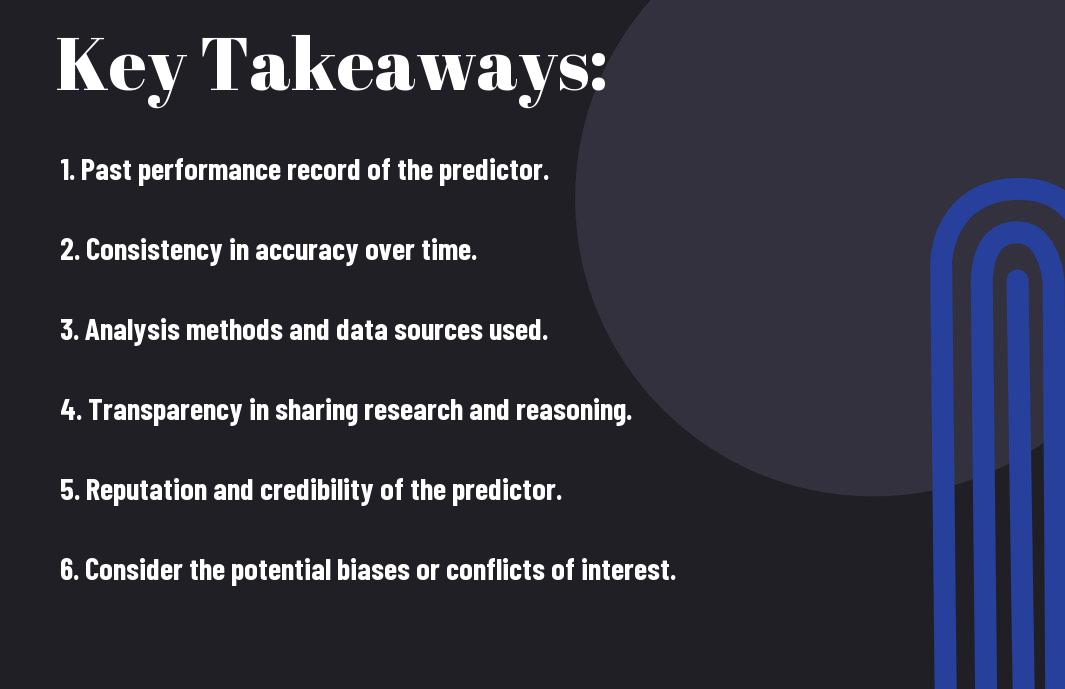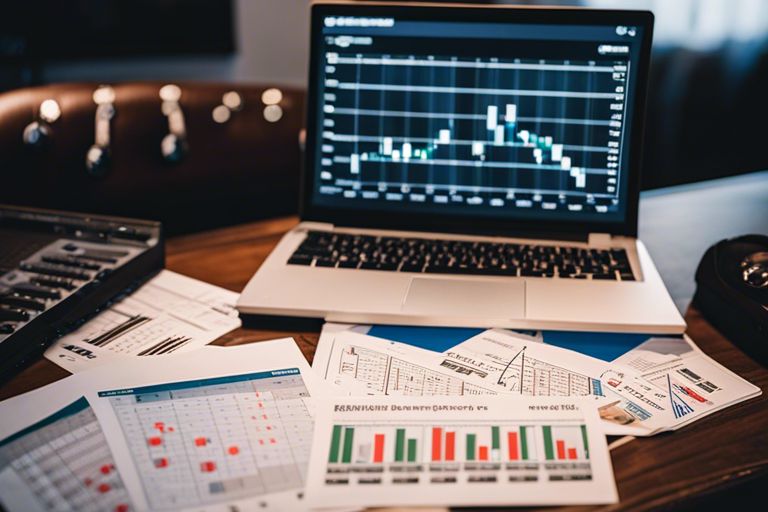Over your journey through the world of sports betting, you may have come across countless tipsters and cappers claiming to have the key to success. But have you ever stopped to consider the importance of transparency in their methods? In this insightful exploration, we dive deep into why knowing how these experts make their predictions can be crucial for your own betting strategies. Stay tuned to uncover the hidden truth behind the world of sports betting and make informed decisions.

Key Takeaways:
- Building Trust: Transparency in the methods used by sports betting tipsters and cappers is crucial for building trust among their audience.
- Credibility: Transparent methods help establish credibility and showcase expertise, increasing the chances of attracting and retaining followers.
- Educational Value: Transparent tipsters and cappers provide insight into their strategies, educating their audience on sports betting best practices and fostering a learning environment.

The Rise of Sports Betting Tipsters and Cappers
While sports betting has been a popular pastime for years, the emergence of sports betting tipsters and cappers has added a new dimension to the industry. These individuals offer insights, predictions, and strategies to help bettors make more informed decisions when placing their wagers. With the rise of social media and online platforms, these tipsters and cappers have gained unprecedented visibility and influence in the sports betting world.
The Growing Popularity of Sports Betting
For many sports enthusiasts, betting on games adds an extra layer of excitement and engagement to the viewing experience. The thrill of potentially earning money based on your sports knowledge and instincts is a major draw for bettors worldwide. As sports betting becomes more mainstream and accessible, the demand for reliable tips and advice has increased, paving the way for the rise of sports betting tipsters and cappers.
The Emergence of Tipsters and Cappers as Influencers
Popularity: The increasing popularity of sports betting tipsters and cappers can be attributed to their ability to provide valuable insights and recommendations to their followers. Through social media platforms, podcasts, and websites, these influencers share their expertise and predictions, helping bettors make more informed decisions. Many tipsters and cappers have amassed a large following, garnering credibility and trust within the sports betting community.
- Recognizing: It is crucial to note that not all tipsters and cappers are created equal. Some may have hidden agendas or lack expertise, so it’s crucial to do your research and choose reputable sources for betting advice.
Betting
While sports betting tipsters and cappers can offer valuable insights and predictions, it is important to approach their recommendations with a critical mindset. Remember that sports betting is inherently risky, and no tipster can guarantee wins. Use their advice as a supplement to your own research and analysis, and always bet responsibly.
- Recognizing: Keep in mind that transparency in the methods and records of tipsters and cappers is vital. Look for individuals who provide detailed explanations of their strategies and track records to ensure you are making informed decisions.
The Importance of Transparency in Methods
Any successful sports betting tipster or capper understands the vital role that transparency plays in their methods. By being transparent about how they analyze games, make predictions, and provide tips, they can build trust with their followers, ensure accountability, and demonstrate their expertise in the field.
Building Trust with Followers
The key to becoming a reputable sports betting tipster is transparency. When you openly share your methods, whether it’s the data you analyze, the strategies you use, or the criteria for choosing your picks, you are showing your followers that you have nothing to hide. This transparency helps build trust and credibility with your audience, making them more likely to follow your advice and recommendations.
Ensuring Accountability and Responsibility
Importance lies in holding yourself accountable as a sports betting tipster. When you are transparent about your methods, it not only builds trust with your followers but also holds you responsible for the advice you provide. Being accountable for your predictions means that you stand by your analysis and are willing to learn from both your successes and failures.
To truly establish yourself as a trustworthy sports betting tipster, it’s important to be transparent about your methods and take responsibility for your predictions. By doing so, you not only build credibility with your followers but also demonstrate your dedication to your craft and the success of those who follow your tips.
The Consequences of Lack of Transparency
Not being transparent about the methods used by sports betting tipsters and cappers can have significant consequences. In the world of sports betting, transparency is crucial for establishing trust and credibility. As highlighted in Professional Sports — Betting on Transparency, when tipsters are not open about their strategies, it can lead to doubts about the validity of their picks and recommendations. This lack of transparency can result in bettors making decisions based on misleading information and false promises.
Misleading Information and False Promises
With the absence of transparency, you may find yourself falling victim to tipsters who make grand promises but fail to deliver consistent results. You could be swayed by flashy marketing tactics and testimonials that may not accurately reflect the tipster’s actual success rate. This can lead to poor betting decisions and financial losses, eroding your trust in sports betting professionals.
The Risk of Fraud and Scams
An necessary consequence of the lack of transparency in sports betting tipping services is the increased risk of falling prey to fraudulent activities and scams. Without clear information on how tipsters make their picks and the basis of their recommendations, you are vulnerable to dishonest operators who manipulate outcomes for their gain. It’s crucial to be aware of the potential for fraud in the industry and to seek out reputable and transparent tipsters to protect your interests.
Fraudulent tipsters may engage in practices such as providing fake betting histories, cherry-picking winning selections, or even coordinating with bookmakers to profit off unsuspecting bettors. By understanding the risks associated with lack of transparency, you can make more informed choices when selecting sports betting tipsters and cappers. Stay vigilant and prioritize transparency to safeguard your betting activities.
The Role of Regulation in Ensuring Transparency
After reading about the importance of transparency in sports betting tipsters and cappers in the Sports Betting Tipsters & Cappers — Beginners Guide, you may wonder how regulation plays a role in ensuring this transparency. Government regulations and industry standards are crucial in maintaining integrity within the sports betting industry.
Government Regulations and Oversight
For a transparent and fair sports betting environment, government regulations and oversight are vital. Regulators set rules and guidelines that sports betting tipsters and cappers must follow to ensure fair practices, accurate information, and disclosure of any conflicts of interest. These regulations help to protect consumers and maintain the credibility of the industry. By requiring transparency in methods, results, and financial disclosures, regulators create a level playing field for both providers and consumers.
Industry Self-Regulation and Standards
Regulation within the sports betting industry is not solely dependent on government oversight. Industry self-regulation plays a significant role in setting and maintaining standards for transparency. By adhering to ethical guidelines, self-regulatory bodies ensure that tipsters and cappers operate with integrity and provide accurate information to their clients. These standards help build trust between service providers and consumers, fostering a more transparent and reliable betting environment.
The establishment of industry standards and best practices by self-regulatory bodies is crucial in upholding transparency and integrity in the sports betting industry. These standards guide professionals in their conduct, ensuring that they deliver honest and accurate information to their clients.
Best Practices for Transparent Methods
Clear Disclosure of Methods and Strategies
Unlike some tipsters who operate behind a shroud of secrecy, the best practice for transparency is to clearly disclose the methods and strategies you use to make your sports betting predictions. When you are open about your approach, your audience can better understand the basis of your tips and make informed decisions about whether to follow your advice.
Regular Auditing and Performance Tracking
An important aspect of maintaining transparency as a sports betting tipster is engaging in regular auditing and performance tracking of your predictions. By keeping detailed records of your past tips and outcomes, you not only hold yourself accountable but also provide valuable information to your audience about the reliability and accuracy of your predictions over time. This level of transparency builds trust with your followers and demonstrates your commitment to providing quality insights.
Clear and consistent performance tracking allows you to analyze your success rate, identify areas for improvement, and adjust your strategies accordingly. This ongoing evaluation process not only benefits your own performance as a tipster but also serves as a tool for accountability and transparency to your audience.

The Benefits of Transparency for Tipsters and Cappers
Increased Credibility and Reputation
To enhance your standing in the sports betting community, transparency in your methods is crucial. By openly sharing your strategies, data sources, and analysis techniques, you demonstrate a commitment to honesty and integrity. This transparency builds trust with your audience, showing that you have nothing to hide and are confident in the quality of your picks.
- Transparency showcases your expertise and dedication to your craft.
- It differentiates you from less reputable tipsters who may rely on vague or dubious methods.
Through transparency, you establish yourself as a reliable and trustworthy source of sports betting advice. This credibility can lead to increased followership and opportunities for collaboration with other industry professionals. Thus, being transparent in your methods can significantly benefit your reputation as a tipster or capper.
Improved Relationships with Followers and Partners
Building on your credibility, transparency also fosters stronger connections with your followers and potential partners. When your audience can see the logic behind your picks and understand the reasoning for your predictions, they are more likely to engage with your content and trust your advice. This transparency creates a sense of transparency creates a sense of inclusivity and community, where your followers feel valued and informed.
These improved relationships can lead to more meaningful interactions, feedback, and support from your audience. By being open about your methods and involving your followers in the analytical process, you not only educate them but also empower them to make informed betting decisions. This collaborative approach enhances loyalty and engagement, ultimately benefiting both you and your followers.
Conclusion
Upon reflecting on the importance of transparency in the methods used by sports betting tipsters and cappers, it becomes evident that trusting these individuals with your money requires a high level of accountability and honesty. Without transparent practices, you are left in the dark about the reliability and accuracy of their tips and predictions. It is crucial to seek out tipsters and cappers who openly share their methods and track record to ensure you are making informed decisions when placing bets.
To further explore the credibility of sports betting tipsters, you may find it helpful to consider the perspectives shared on Quora. By staying informed and demanding transparency from those providing betting advice, you can increase your chances of success and protect yourself from potentially misleading or fraudulent practices within the sports betting industry.
Q: Why is transparency important in the methods used by sports betting tipsters and cappers?
A: Transparency is important because it allows bettors to assess the credibility and reliability of the tipster or capper. When the methods are transparent, bettors can understand how the picks are selected, the reasoning behind them, and the track record of the tipster. This helps to build trust and confidence in the tips provided.
Q: How can transparency benefit sports bettors when following tipsters and cappers?
A: Transparency benefits sports bettors by enabling them to make informed decisions. When bettors have access to information about the methods used by tipsters and cappers, they can evaluate the quality of the picks and determine if the tips align with their own betting strategies. This ultimately helps bettors make better choices and potentially improve their betting outcomes.
Q: What can sports betting tipsters and cappers do to ensure transparency in their methods?
A: Sports betting tipsters and cappers can ensure transparency by providing detailed explanations of their selection process, sharing past performance data, and being open about any affiliations or biases that may influence their picks. Additionally, disclosing any potential conflicts of interest and being honest about the risks associated with betting tips can contribute to transparency and build trust with bettors.
















